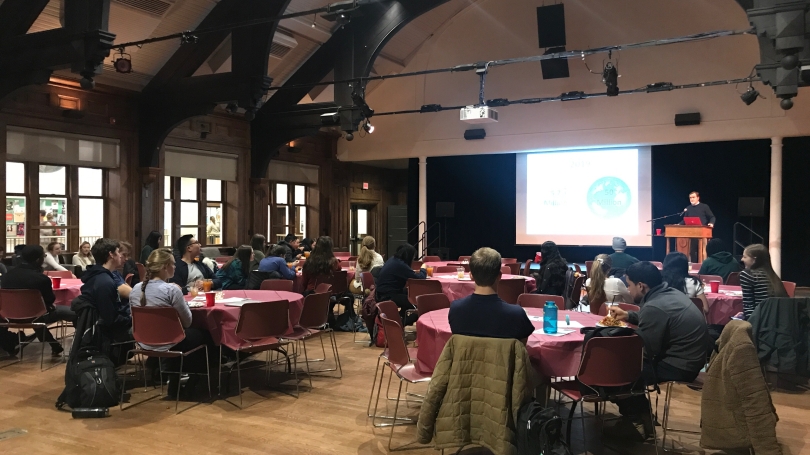
- Public Policy
- Leadership
- Funding
- News & Events
- About the Center
Back to Top Nav
Back to Top Nav
Back to Top Nav
Back to Top Nav
GlobeMed hosted its annual Benefit Dinner. Megan Ungerman ‘21 shares her organizing the dinner.
Hosting GlobeMed’s 7th annual Benefit Dinner was a truly valuable experience. I felt great pride being able to share what our club does with the rest of campus. We are global health group in a sustainable partnership with the Kachin Women’s Association Thailand (KWAT). KWAT helps to provide health care and other necessary services to people within the Kachin State of Burma. Currently, the Kachin people face violence and discrimination in Burma. Many are fleeing the country or placed in internally displaced persons (IDP) camps. KWAT’s work is essential to the survival of the Kachin people.
Throughout the school year GlobeMed at Dartmouth raises money to fund KWAT’s laboratory, where blood work and other important tests are done for sick patients. As a club we also hope to raise awareness, not just of Kachin people, but also of global health issues more broadly. Our Benefit Dinner took place on February 20th, the World Day of Social Justice. Global health and social justice are inherently linked as not everyone has equal access to health care. By raising awareness of these issues, GlobeMed hopes to spur our generation into action, tackling these inequalities and making a more just, more healthy world.
Our guest speaker at the event, Dr. Robert Santulli, is a visiting professor in the department of Psychological and Brain Sciences. His work focuses on aging, dementia, and Alzheimer's Disease. His talk, entitled, “Dementia: A Global Challenge,” taught us what specifically dementia was versus Alzheimer's disease. In simple terms, Dementia is a broad category that Alzheimer's disease falls under; moreover, there are many different types of dementia. Dr. Santulli talked about how the burden of dementia is increasing due to people living longer. We also explored the problems that lower and middle income countries face, such as a lack of resources and understanding around the disease.
In addition to the actual dinner, I also learned how to successfully put on an event. It takes so much time and effort to plan a dinner like this, and I was really grateful to have been awarded a Rockefeller Mini-Grant to help pay for food and decorations. With this help, we were better able to attract people to come to our event and engage with the ideas of global health and social justice. Sometimes at Dartmouth, with stressful ten week terms, we can forget the outside world. I believe this event was important to not only bring community together, but also push us to think on a global scale when it comes to health and disease.
-Submitted by Megan Ungerman ‘21, Rockefeller Center Mini Grant Recipient
The Rockefeller Center's Mini-Grants program funds registration fees for students attending conferences, as well as the costs of bringing guest speakers to Dartmouth. The views and opinions expressed here are the author’s own and do not necessarily represent the views and opinions of the Rockefeller Center or constitute an endorsement by the Center.